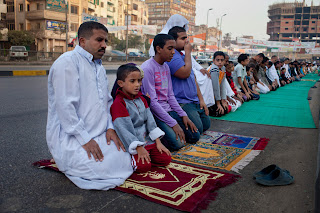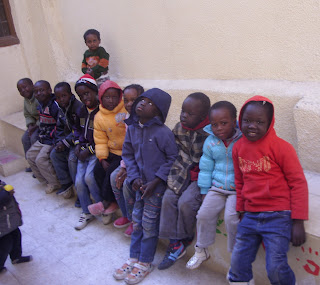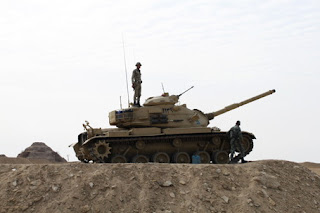January 29th marked the start of the new term at AUC. I’m teaching two courses, one a history of American advertising called “Advertising the American Dream” and the other a course on postwar American culture and its echoes in contemporary culture called “Postwar/Postmodern.” Its topics include the creation of suburbia, Tupperware and fast food, Tiki bars and shopping malls. It’s one of my favorite courses to teach since the material is so much fun. The first week of classes never counts at AUC since students are still shopping for courses, so I’ve kept the lectures light. I get to sleep in this term to 7AM since I take an 8:10 bus to campus, a nice change from the 7:15 bus last term. My buddies Sarah and Mark Mineart are often on my bus one way or the other, which makes the commute pass with pleasure.
The first anniversary of the revolution passed without incident on the 25th, and Friday’s demonstrations also seemed to go peacefully. There is a lot of debate in the papers about Egypt’s future, and with reason: financially, the country is really hurting, with tourism down, unemployment high, and hard currency reserves dwindling. Harris and I read the Guardian and Al-Masry Al-Youm online to keep up, and it’s hard to reconcile the hopes of the revolution with the facts of life.
We went to an Embassy reception in honor of Meghann Curtis, the new deputy assistant secretary of educational affairs for the State Department on Sunday night at a villa in Zamalek owned by the Embassy, and home to one of its senior officers. Ms. Curtis oversees a number of programs, including Fulbright, and this was her first visit to Cairo. We did our best to reflect well on the program and toned down our usual table-dancing and beer-chugging. Alas, I could not photograph the beautiful villa owned by the Embassy, nor the groaning boards of the buffet, which I did my best to lighten up, but I did bring this small souvenir.
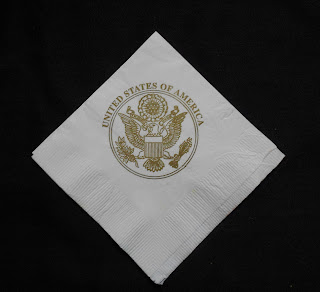 |
| We went to a swank Embassy event and all we got was this napkin |
On most days, as I pass through the gates to get my bus home, there is a farm stand set up there showcasing produce from AUC’s Desert Development Program. This ecologically sensitive program helps farmers in the desert, and their produce sells at the bus gate for wonderfully low prices. Yesterday, I bought a half dozen seedless oranges, half a kilo of broccoli, and a kilo of courgettes (little zucchini) for around 18LE. Mama would have been amazed to see me, generally one who won’t eat fruit, devour the oranges. They were so juicy and so good that I’m hoping I can score another bag full on Wednesday. The good produce has inspired us to cook more, order out less, and to her sorrow, have Kiki cook less often (she loves to cook, probably because she loves to eat while she cooks). We have found a great greengrocer down the street, and sources for Australian lamb and beef, and pork, and salmon. I think there’s also part of us that misses the way we eat at home, so rosemary potatoes, Brussels sprouts, and rack of lamb is a connection to home.
 |
| Some produce from the Desert Development |
That might also explain my sense of dread about leaving Egypt. The start of the term signals the end of our time here, months away though it is. Not only do I get anxious about the logistics of clearing out our flat, but neither of us really want to leave. We are starting to think about how to come back, perhaps if Harris wins a Fulbright. We heard that you cry when you arrive and you cry when you leave Egypt, and I believe it. The place really gets under your skin and makes you love it. Harris says that he feels like Mr. Outside, not a shy guy, for some reason in Egypt—maybe the openness of the people?—but watching him work the Embassy crowd as well as the guys at the grocery store makes me happy. Plus he’s productive, working on poetics, thinking Deep Thoughts, and delivering the goods. I’m less productive in the Deep Thoughts department, but of course, I have a fulltime job, so that’s my excuse and I’m sticking with it!
Today, February 2nd, we awoke to the news of a riot amongst football fans in Port Said, with over 70 killed. We all thought that if there were a bad day, it would be the 25th. Theories and conspiracy theories abound, the most common I’ve read suggesting that the lack of security at the match was planned; criminals were released into the stadium to instigate violence; football fans were targeted by the SCAF (Supreme Council of Armed Forces) because of their support of the revolution; and the riot was incited to reinforce SCAF’s seeming right to rule since only they can keep order. There will be three days of national mourning, and the fragility of the country only increases. It hasn’t affected our lives directly but everyone is very upset. There are demonstrations planned throughout the next few days. AUC has extended its add/drop period (during which we essentially can’t teach since students are shopping for courses) to acknowledge the unrest. Banks have been robbed, and many have either closed their ATMs and reduced the amount one can withdraw.
 |
| News photo from Port Said |
 |
| News photo of football "ultra" fans, Port Said |
The night of February 2nd, we went to the Four Seasons Nile Plaza for a reception for Fulbrighters, present and former, in Egypt. Most of those there were Egyptians who had studied or taught in the U.S., and remained active in cross-cultural exchange in Egypt. There were speeches, appreciations, and gifts, a dinner buffet, but what began the event was a moment of silence for the victims of the football massacre in Port Said. Our drive downtown was the fastest ever, not just owing to Emad’s speedy driving, but because so many people who would normally be out and about on a Thursday night were either marching on a government building or staying home. Emad summed it up best as he dropped us back home after a somber evening: “pray for our country.”
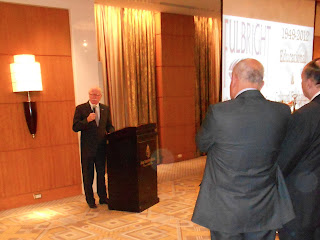 |
| Fulbright reception, Bruce Lohof speaking |
On to the trivial: car culture in Egypt. As I contemplate returning to the U.S., which despite horrible accidents on Florida highways, is largely a law-abiding and safe place to drive, the contrasts with Egypt leap out. You can drive the wrong way on a one-way street if you need to. Lines painted for lanes on roads are mere suggestions at best. And then there’s the small stuff. You can park pretty much anywhere; in Ma’adi, double-parking is common, and at busy times, triple-parking occurs. There are men (and some women) who work every morning washing cars, causing the dirt in the streets to turn to mud (another reason your shoes wear out fast here), and their universal signal that a car has been washed are windshield wipers left raised. Harris has remarked that though much has been written about the Arab Street, nothing about the Arab Sidewalk, since it doesn’t really exist. Hence, one walks in the Arab Street. Finally, in addition to cars, trucks, buses, motorcycles, pedestrians, and bicycles, streets here include donkey-and-horse-drawn vendors, like this fellow who kindly allowed me to photograph him a block from our flat.
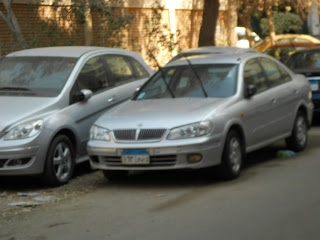 |
| Wipers up means it's clean |
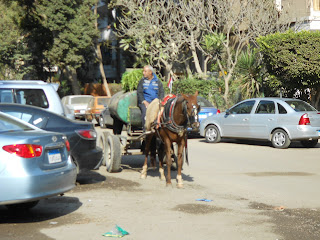 |
| Street vendor in Ma'adi |
Our buddies, Sarah and Mark, have adopted a kitten, a former street cat now living in luxury. They’ve named her Eliza, as in Doolittle, partly as an homage to her humble origins and their lives in the theater, but also for her behavior. As in, she does little. On the bus to work the other day, Mark showed me photos from their January trip to Kenya. I was struck by photos of a cheetah up close and personal, acting just like a cat until it caught the scent of possible prey and went from large kitty cat to predator. I also loved pictures of zebra mothers with their offspring, wrapped in the zebra version of a hug.
 |
| Just a big kitty! |
 |
| Or just a big predator? |
 |
| Sarah and Mark on the Tanzania-Kenya border |
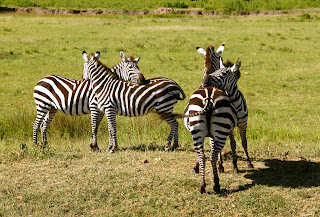 |
| Nuzzling zebras |
Finally, I have complained before in this blog about how dirty Cairo is, both the pollution and the streets. After noticing funny marks on my clothing, I realized they came from the clothespins, which pick up dirt in the air. So in addition to washing clothing every time it’s worn, washing the clothes lines, the balcony from which they hang, and the hardware, we now wash the clothespins. Adding to our Sisyphean efforts to keep things clean is a special wind that kicks up in February, called the khamsin. We have already had a small dust storm that darkened one afternoon, and locals tell me to expect more. Contact lens wearers, they say, revert to glasses, dust pours through the cracks in doors and windows, and four broom-wielding housekeepers a day can’t keep it out. Ah, well.
The seemingly trite sign-off, "Peace" seems particularly appropriate today.
